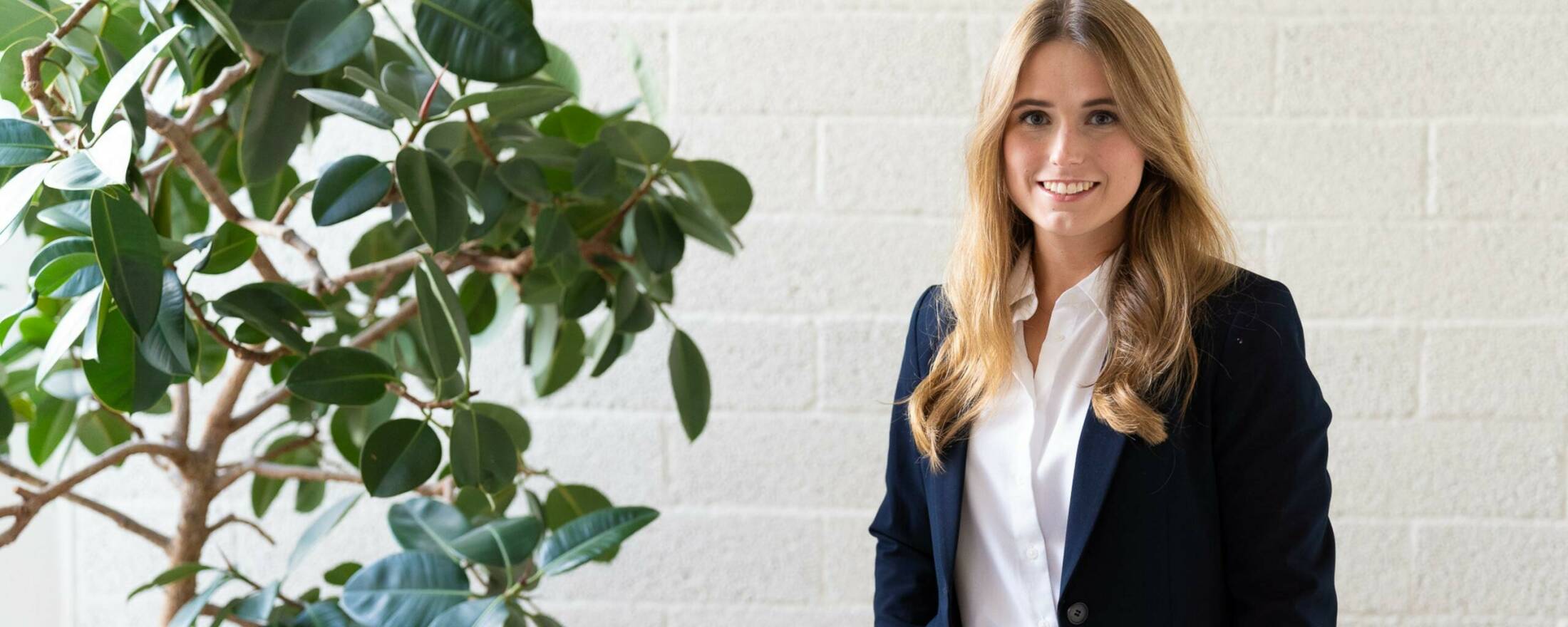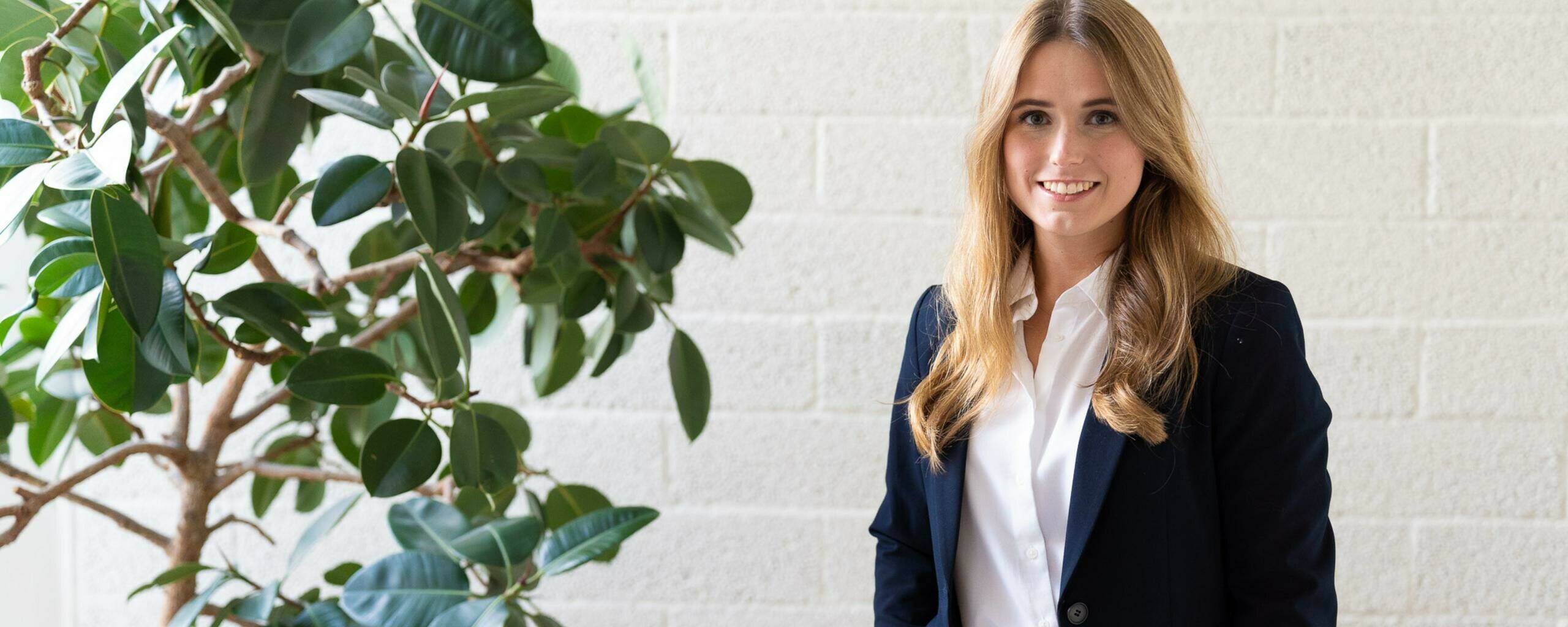
With a Bachelor's degree in economics and a Master's degree in Management, Malin Setterström gained variety and breadth in her education, something she feels she has greatly benefited from today in her work as a management consultant at Fortos Management Consulting.
Describe your job, what you do, and what your responsibilities are.
-I am a management consultant at Fortos where I work with different types of customer projects in the automotive industry. It is mainly about being part of the customers' transformation journey and helping them with different challenges. My responsibilities have included project management of new market launches or establishing new car sales processes.
How did you end up at your current workplace?
-During my five years at The School of Business, Economics and Law combined with various extra jobs, I realised that I would become a management consultant after graduation. My interest grew primarily from my time at HandelsConsulting, one of the student union companies at the School, which then led to other exciting assignments alongside my studies.
Being part of the automotive industry's transformation journey was what made me choose Fortos as an employer.
How was the transition from studies to working life for you?
-It wasn't difficult because I had been working on different projects throughout my studies. I was rather looking forward to being able to focus on a job when I started. I just couldn't wait to get started, I think.
How has your education at the School helped you in your career?
-With a bachelor's degree in economics and a master's degree in management, I got variation and breadth in my education that I have greatly benefited from today. Then I studied some more niche courses such as strategy and project management that I have been able to apply directly in my career. You are prepared with the right knowledge and have allowed me to work with something I am passionate about. The School's focus on sustainability is also something I take with me in my career where I have contributed with knowledge and the opportunity to influence companies in the right direction.
Do you have an example of a soft skill that you developed during your time as a student at the School?
-I developed an analytical mindset that is a must for management consultants and many other roles. This means that you can collect and analyse information that is then used for decision-making or problem-solving. I have also learned to be more organised and structured to succeed in finishing a project, group work, or passing an exam, all the more important when you have many ongoing projects at the same time.
What was the highlight of your time as a student at the School of Business, Economics and Law?
-It was when I got to write my Master's thesis in sustainability and change management together with Sweco and my fantastic classmate Stina Lexö (formerly Magnusson). The fact that we also received the Richard C Malmsten Scholarship for the best thesis on the Management Master's programme in 2021 made it even more fun! Also the time at HandelsConsulting, all the students I worked with there and so many exciting projects I got to be part of, it was a good time!
Do you remember any specific course particularly well?
-During my Bachelor's studies, it was Micro economics that was most interesting, in my opinion. On the management Master's degree, I particularly remember Change Management, when you realised that business transformations and project management are not easy, which made it even more exciting!
How did you reason when you chose your specialisation?
-I was looking for a broad programme that would give me good preparation for professional life. I was curious to gain deeper knowledge in macro and micro economics and economics was the right choice. Then it was project management and leadership that made me choose the Master's Programme in Management.
Do you have any tips or advice for a current student?
-Firstly, I think it was incredibly useful to try out different jobs and projects in combination with my studies at the School, to put theory into practice. That is how I found what I want to do and what I don't want to do. Secondly, it is very good to find a study group and study together, talk about cases and exams so you don't do it alone! One last tip is to create relationships and networks, not only with the companies at the fairs but especially with other students, you will see them in the workplace again!
With a Bachelor's degree in economics and a Master's degree in Management, Malin Setterström gained variety and breadth in her education, something she feels she has greatly benefited from today in her work as a management consultant at Fortos Management Consulting.
Describe your job, what you do, and what your responsibilities are.
-I am a management consultant at Fortos where I work with different types of customer projects in the automotive industry. It is mainly about being part of the customers' transformation journey and helping them with different challenges. My responsibilities have included project management of new market launches or establishing new car sales processes.
How did you end up at your current workplace?
-During my five years at The School of Business, Economics and Law combined with various extra jobs, I realised that I would become a management consultant after graduation. My interest grew primarily from my time at HandelsConsulting, one of the student union companies at the School, which then led to other exciting assignments alongside my studies.
Being part of the automotive industry's transformation journey was what made me choose Fortos as an employer.
How was the transition from studies to working life for you?
-It wasn't difficult because I had been working on different projects throughout my studies. I was rather looking forward to being able to focus on a job when I started. I just couldn't wait to get started, I think.
How has your education at the School helped you in your career?
-With a bachelor's degree in economics and a master's degree in management, I got variation and breadth in my education that I have greatly benefited from today. Then I studied some more niche courses such as strategy and project management that I have been able to apply directly in my career. You are prepared with the right knowledge and have allowed me to work with something I am passionate about. The School's focus on sustainability is also something I take with me in my career where I have contributed with knowledge and the opportunity to influence companies in the right direction.
Do you have an example of a soft skill that you developed during your time as a student at the School?
-I developed an analytical mindset that is a must for management consultants and many other roles. This means that you can collect and analyse information that is then used for decision-making or problem-solving. I have also learned to be more organised and structured to succeed in finishing a project, group work, or passing an exam, all the more important when you have many ongoing projects at the same time.
What was the highlight of your time as a student at the School of Business, Economics and Law?
-It was when I got to write my Master's thesis in sustainability and change management together with Sweco and my fantastic classmate Stina Lexö (formerly Magnusson). The fact that we also received the Richard C Malmsten Scholarship for the best thesis on the Management Master's programme in 2021 made it even more fun! Also the time at HandelsConsulting, all the students I worked with there and so many exciting projects I got to be part of, it was a good time!
Do you remember any specific course particularly well?
-During my Bachelor's studies, it was Micro economics that was most interesting, in my opinion. On the management Master's degree, I particularly remember Change Management, when you realised that business transformations and project management are not easy, which made it even more exciting!
How did you reason when you chose your specialisation?
-I was looking for a broad programme that would give me good preparation for professional life. I was curious to gain deeper knowledge in macro and micro economics and economics was the right choice. Then it was project management and leadership that made me choose the Master's Programme in Management.
Do you have any tips or advice for a current student?
-Firstly, I think it was incredibly useful to try out different jobs and projects in combination with my studies at the School, to put theory into practice. That is how I found what I want to do and what I don't want to do. Secondly, it is very good to find a study group and study together, talk about cases and exams so you don't do it alone! One last tip is to create relationships and networks, not only with the companies at the fairs but especially with other students, you will see them in the workplace again!
